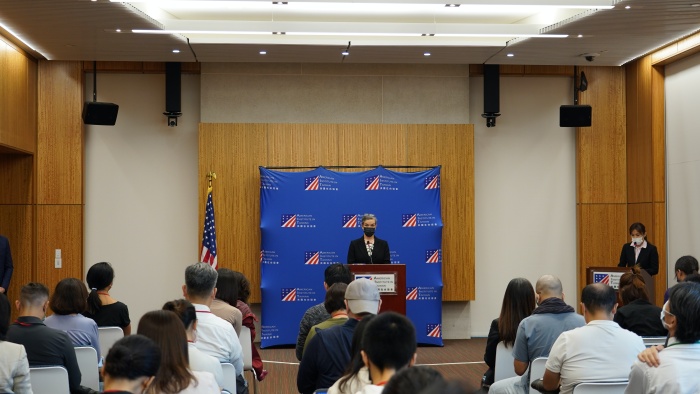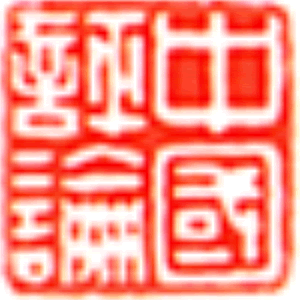
|
| 美国在台协会(AIT)台北办事处长孙晓雅今天举行上任首度记者会。(照片:AIT提供) |
孙晓雅致词英文全文:
Good morning everyone, thank you for coming today. I hope you got through the door without any problem. It is fantastic to see all of you here in person. Given my schedule and the COVID requirements, I have not had the opportunity to really talk with most of you since arriving in Taiwan earlier this summer.
I have, however, been reading your reporting and I am looking forward to a good discussion today.
I would like to provide a few framing thoughts before we start with the Q and A portion.
The U.S.-Taiwan relationship is in a really good place.
We believe in deepening our engagement and connections with the people of Taiwan consistent with U.S. interests and our “one China” policy, which is guided by the Taiwan Relations Act, the Three Communiques, and the Six Assurances. The value of our partnership and our support for Taiwan is rock solid. We are committed to deepening our ties with Taiwan – a leading democracy and a critical economic and security partner.
Over the past almost two years, we have seen Taiwan’s successful handling of the COVID-19 pandemic. Taiwan was there for us in spring 2020, and I was living in Washington at the time, so I really, I know this. When Taiwan became the largest doner to the United States of surgical masks and PPE at a time when we really needed them, and we were likewise really proud to be able to donate 2.5 million Moderna vaccine doses to Taiwan earlier this summer before I arrived as Director in Taiwan’s time of need.
We are in the first year of the Biden Administration. Here I’d like to stress that although we have seen significant policy shifts on other issues, the fundamentals of the U.S. relationship with Taiwan remain the same. All presidents leave their mark on U.S. foreign and domestic policy, President Biden will as well. We already know several significant new areas of policy focus are out there, including prioritizing climate change, energizing White House efforts to combat COVID at home and around the globe, and promoting U.S. and global economic recovery from the pandemic.
Tactics are also changing – the Biden Administration is using a multilateral approach to many problems the Trump Administration faced with a bilateral or unilateral action. We see this on the security side, with initiatives like AUKUS; on the climate change issue with the renewed U.S. leadership through the COP process and at COP 26 in Glasgow; and across the board, as with the Summit for Democracy later this year.
So the question we really have is how are these policy shifts affecting the U.S.-Taiwan relationship? First, I’d like to start with what remains the same.
Indo-Pacific Security: We continue to have a shared and abiding interest in peace and stability across the Taiwan Strait. The U.S. considers this central to the security and stability of the broader Indo-Pacific region and to the United States, and we are deeply concerned by ongoing PRC efforts to undermine that stability. Our commitment to Taiwan is rock solid and contributes to the maintenance of peace and stability across the Taiwan Strait and within the region.
Interconnectedness: Our shared economic prosperity remains a key pillar of our relationship. More than ever, topics that used to be considered merely “economic” or merely “tech” issues – such as secure supply chains, 5G, and cybersecurity – have become critical elements of national security.
We recognize the critical role Taiwan plays in global supply chains, especially in critical technologies like semiconductors, and we will continue to work together to ensure these supply chains remain safe and secure.
Openness and Access: Taiwan is a reliable partner, a vibrant democracy, and a force for good in the world. The United States remains committed to supporting Taiwan as it seeks to expand its already significant contributions to addressing global challenges. The United States will continue to support Taiwan as it resists efforts to constrain its appropriate participation on the world stage, including in international organizations.
In this context, we will continue to develop our ties and strengthen our engagement with Taiwan in a number of ways. One growing focus will be collaboration on countering cyber security threats.
On trade and investment, starting in June the U.S. and Taiwan re-launched our Trade and Investment Framework Agreement talks, setting the stage for broader and more consistent engagement on these important topics.
As one of his first Executive Orders, President Joe Biden launched a review process designed to create more resilient and secure supply chains for critical and essential goods. As President Biden said, “building resilience will mean increasing our production of certain types of elements here at home. In others, it’ll mean working more closely with our trusted friends and partners…so that our supply chains can’t be used against us as leverage.”
On security cooperation, we are committed to helping Taiwan maintain its ability to defend itself and also to work together on shared challenges like maritime law enforcement and humanitarian assistance and disaster relief in the Indo-Pacific region.
People to people ties remain the bedrock of our relationship. These ties are deep and historical. Thousands of students and teachers move back and forth between our shores every year. The U.S.-Taiwan Education Initiative is a concrete example of how we work together to facilitate language teaching and learning in support of both Taiwan’s and the United States’ priorities in this area.
There are four key elements in the U.S.-Taiwan relationship – maintaining security cooperation, expanding our economic partnership, preserving Taiwan’s international space, and bolstering people-to-people ties – as well as some newer areas like cybersecurity and supply chains. The United States will act on all of these fronts, including in the multi-lateral context, to advance these objectives.
Aside from the issues I just mentioned, we will continue to advance global and regional goals of the Biden Administration, including countering malign PRC influence, recovering from the devastating impacts of the pandemic, and addressing the threat of climate change. Working with Taiwan to tackle the cross-cutting “horizontal” issues will help build a capable and resilient regional order and advance our shared interests in trade and investment, security cooperation, people-to-people ties, and shared democratic values.
With that, I will stop there and look forward to a robust discussion with you all today.
|
